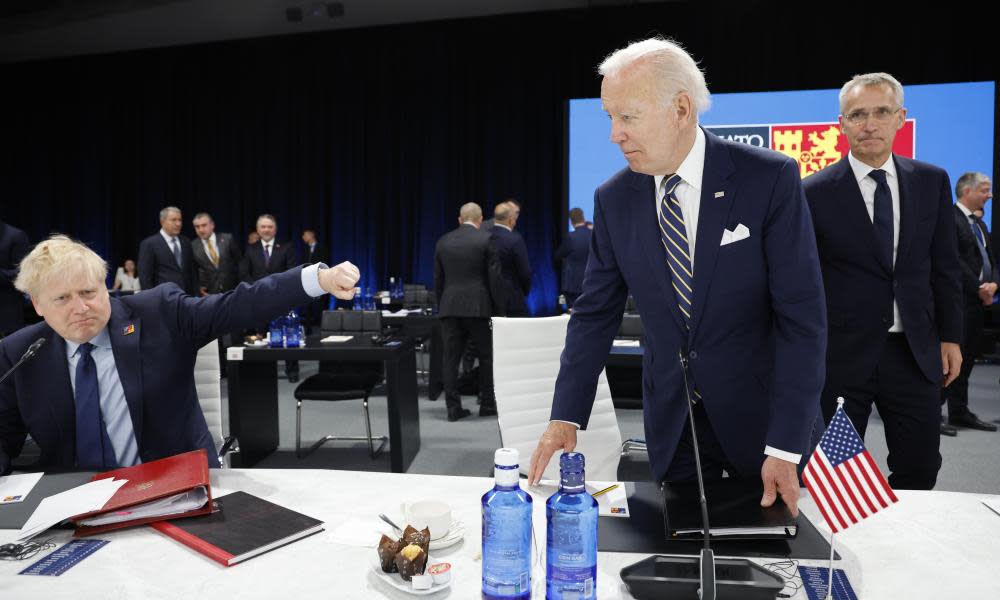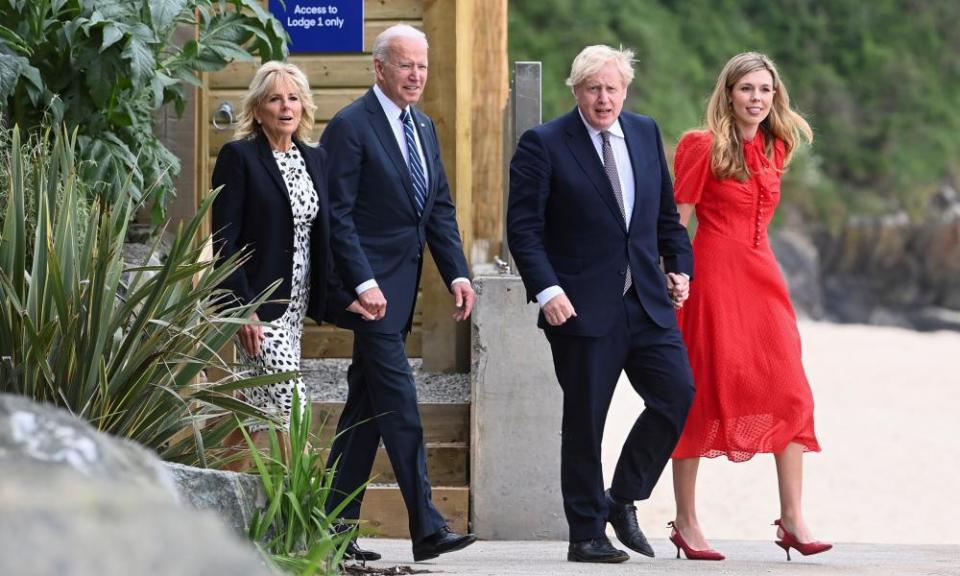Biden says US-UK ties ‘remain strong’ amid some relief over Johnson exit
- Oops!Something went wrong.Please try again later.
- Oops!Something went wrong.Please try again later.
- Oops!Something went wrong.Please try again later.

Joe Biden and Boris Johnson could never be described as political soulmates, and the British prime minister’s humiliating departure on Thursday was met with some relief in Washington after years of tension, particularly over Brexit.
The White House will now be hoping that the Conservative party can find a successor who offers more predictable, less chaotic leadership, and without Johnson’s zeal to rewrite the Brexit deal’s Northern Ireland protocol.
Related: Boris Johnson resigns and says no new policies until next prime minister announced – live
In a brief official statement that did not mention Johnson, 58, by name, the US president said he looks forward to continuing “close cooperation” with the UK and other allies on priorities including the war in Ukraine. Biden, 79, insisted that the “special relationship” between the people of America and Britain “remains strong and enduring”.
“When the dust settles in London, Johnson’s resignation will do more good than harm to the US-UK relationship,” said Charles Kupchan, who served as president Barack Obama’s Europe adviser in the White House.
“That’s mainly because Washington needs a very steady hand on the steering wheel and Johnson has lurched from one crisis to the next. He hasn’t been able to provide the kind of continuity and the political strength that the US and the world desperately need right now.”
Johnson was always regarded with scepticism by many Democrats. In 2016 he caused offense by claiming that Obama, whose father was Kenyan, had a Winston Churchill bust removed from the Oval Office because of “ancestral dislike of the British empire”.
In 2019 Biden called Johnson a “physical and emotional clone” of Donald Trump, the then president and a cheerleader for Britain’s exit from the European Union.
Democrats, by contrast, were alarmed by Brexit and the threat it poses to the Good Friday agreement in Northern Ireland. Nancy Pelosi, the speaker of the House of Representatives, recently warned that rewriting the Northern Ireland protocol – designed to avoid placing a trade and customs border across the island of Ireland – could jeopardise any hope of a UK-US free trade deal.
Biden and Johnson found common cause in Ukraine, however, following the Russian leader Vladimir Putin’s unprovoked invasion.
The US and UK have both poured in weapons and money to support Ukraine’s government while strengthening the Nato alliance. Britain also signed up to a security pact with the US and Australia that aims to provide a counterweight to China.
Kupchan, a senior fellow at the Council on Foreign Relations and professor of international affairs at Georgetown University, said: “Washington has been pleasantly surprised by Johnson’s foreign policy. He’s been quite activist: quite forward-leaning on the war in Ukraine, dealing with China and striking the Aukus deal with Australia.
“There were many of us here in Washington who were afraid that Brexit was marking the beginning of an inward turn, and Johnson has to some extent proved that assessment to be incorrect.”
He added: “The unknown unknowns at this point obviously have to do with who comes next, and if there is to be a worry in Washington, it would be on Brexit and the Northern Ireland protocol. We just don’t know where the next prime minister will take that issue, but the last thing the United States wants to see right now is a row between the UK and the EU and further troubles in Northern Ireland.”
For Biden, Ireland is personal. He frequently refers to his mother’s family history and his connections to County Mayo. He loves to quote Irish poets such as Seamus Heaney and WB Yeats. He has been known to cite British imperial rule in Ireland as an example to empathise with persecuted minorities.
Biden was among group of senators in the 1980s who began pushing for greater American diplomatic involvement to end the conflict in Northern Ireland. As a member of the Senate foreign relations committee, he helped push the Bill Clinton administration into brokering the Good Friday agreement in 1998, which enjoys rare bipartisan support in Washington.
Brett Bruen, who was director of global engagement at the Obama White House, said: “It’s no secret that Joe Biden has a big soft spot in his heart for Ireland so that was always going to be a challenge with the relationship.

“But I think it’s bigger than Ireland. It’s the notion that, when you sign an agreement, when you make a commitment, you’re going to live by it. And now it is starting to raise other concerns of whether or not Johnson and his government would backtrack even on things like Ukraine when it got politically inconvenient or expedient to take a different path.”
Johnson, who was born in New York, went to the White House last September with the rift over Northern Ireland still unhealed and, in terms of the hope for a trade deal, went home empty-handed (though he and Biden did find some personal chemistry in their shared love of trains). From his hair to his shamelessness, from his crude populism to his mendacity, he could never quite shrug off the Trump comparisons.
Bruen, president of the Global Situation Room consultancy, commented: “He was viewed as a little bit of a mercurial character. Sometimes he would say the right things. He would even do the right thing, at least as far as the Americans were concerned, from time to time, but he wasn’t necessarily someone who put the special relationship at the heart of his foreign policy.
“There wasn’t enough room for it with his ego and with his political ambitions and challenges. The hope in Washington right now is that we will get somebody who can bring perhaps a little bit more of an understated and yet much more solid and sustainable relationship with the US. There won’t be any tears shed in the West Wing this evening.”
It is safe to say the relationship between Johnson and Biden will not join the transatlantic hall of fame alongside Churchill and Franklin Roosevelt, Margaret Thatcher and Ronald Reagan, or Clinton and Tony Blair.
Sidney Blumenthal, a former assistant and senior adviser to Clinton, said: “There’s always been a strange symmetry between the United States and Britain in politics. It hasn’t been exactly synchronised always, but there’s been a transatlantic relationship that’s more than a resonance. The decline and fall of Boris while the January 6 committee is exposing Trump is part of the history of the transatlantic resonance of our politics.”
Blumenthal also noted: “The question of Northern Ireland is still unresolved. The mess that Boris leaves lives on without him.”

